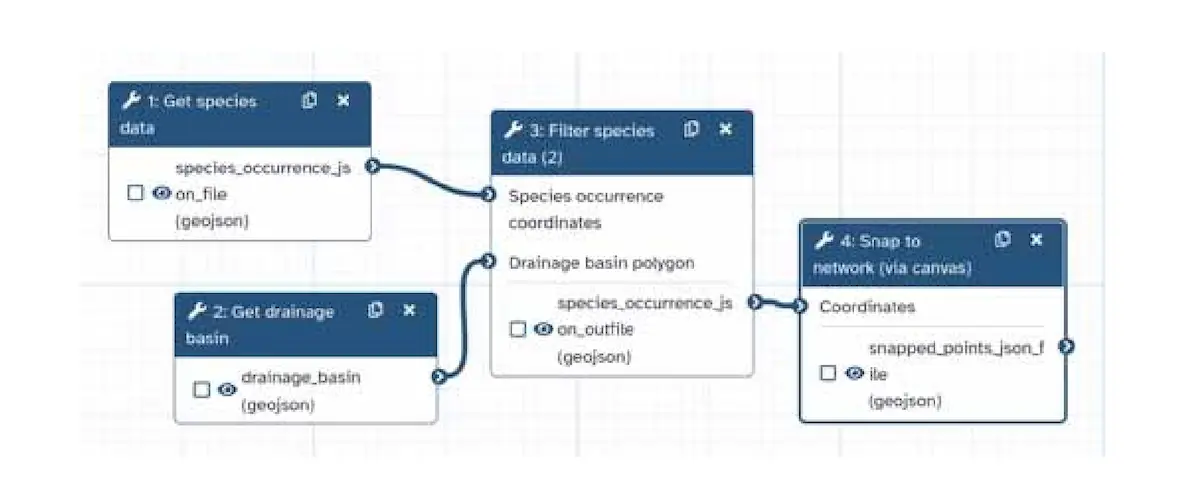AquaINFRA News
AquaINFRA Virtual Research Environment Showcased at IMDIS 2024: Uniting Freshwater and Marine Aquatic Research
June 19th, 2024

At the recent IMDIS 2024 conference, Merret Buurman from the Leibniz Institute for Freshwater Ecology and Inland Fisheries (IGB) presented the AquaINFRA Virtual Research Environment (VRE) during the poster session. This facet of the AquaINFRA project highlights the transformative potential of server-based computing for aquatic research.
The paper entitled "The AquaInfra VRE: A platform to perform freshwater and marine research online" by Merret Buurman (IGB), Dr. Markus Konkol (52°North), Vanessa Bremerich (IGB) and Dr. Sami Domisch (IGB) is published in the IMDIS 2024 conference proceedings (page 382).
In addition, the AquaINFRA Project was presented by project coordinator Henning Sten Hansen from Aalborg University in the paper, entitled "The AquaINFRA Interaction Platform: A New Era for Aquatic Research" as part of the session on "SERVICES: Data services and tools in ocean science".
AquaINFRA: Uniting Water Scientists Across Europe
Launched in 2023 and funded by the Horizon Europe Framework Programme, the AquaINFRA project aims to unify freshwater and coastal marine scientists across Europe. It provides FAIR (Findable, Accessible, Interoperable, and Reusable) and EOSC-compliant data and processing services. The AquaINFRA VRE is a pivotal component, enabling scientists to perform data-intensive computing tasks efficiently in a virtual environment.
While large-scale analyses are common in marine research, freshwater studies often focus on smaller areas like individual lakes or river catchments. However, the availability of high-resolution data has increased the need for large-scale analyses across rivers, lakes, coasts, and groundwater. For example, the Hydrography90m dataset created by Amatulli et al. (2022) allows detailed analysis of over 40 hydrological variables at a high spatial resolution, demonstrating the necessity for server-based computing to handle such extensive datasets.
The AquaINFRA VRE: Combining Galaxy and OGC Processing Services
The AquaINFRA VRE facilitates web-based processing of freshwater and marine datasets, emphasising usability and reproducibility by integrating the Galaxy platform with Open Geospatial Consortium (OGC) processing services.
Galaxy Platform: Initially developed for genomic research, Galaxy allows users to choose from a variety of tools to analyse data. Its workflow canvas is a graphical interface that enables the chaining of tools to create reproducible workflows, which can be executed repeatedly.
OGC Processing Services: To enhance interoperability, AquaINFRA deploys its tools as OGC processing services using Pygeoapi. These services run on a server and can be accessed via a standardised REST API, making it possible to integrate them into any routine that supports HTTP requests. Scientists who prefer graphical interfaces can still access these services through Galaxy tools, which call the services via HTTP, retrieve the results, and make them available in Galaxy for further use.

Architecture of the AquaINFRA VRE.
Example Workflow: Fish Distribution in a Brazilian River
An illustrative use case involves analysing species habitat in a Brazilian river, utilising the R package hydrographr. The steps include:
- Retrieving Species Occurrence Data: Data is obtained from the Global Biodiversity Information Facility (GBIF).
- Spatial Filtering: Coordinates are filtered using the outline of the São Francisco River basin, available from Hydrography90m.
- Snapping to River Network: Coordinates are aligned with the nearest stream segment to facilitate subsequent analysis.

Screenshot of the workflow canvas in Galaxy, showing the first steps of a larger fish habitat analysis.
Each step can be performed via HTTP, returning results as GeoJSON, or visually in Galaxy, where input parameters are provided through entry fields and dropdown menus. These tools can be chained using Galaxy's graphical canvas, enabling a one-click execution of all steps.


